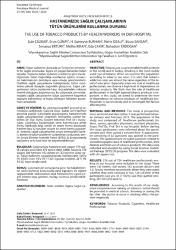HASTANEMİZDE SAĞLIK ÇALIŞANLARININ TÜTÜN ÜRÜNLERİNİ KULLANMA DURUMU

Göster/
Erişim
info:eu-repo/semantics/openAccessTarih
2020Yazar
Çilekar, ŞuleGünay, Ersin
Burhan, H. Sümeyye
Özalp, Nehir
Sansar, Büşra
Ertürk, Senanaz
Kıran, Melike
Çakır, Eda
Erdoğan, Bahaddin
Üst veri
Tüm öğe kaydını gösterKünye
ÇİLEKAR, Ş., & Günay, E. (2020). HASTANEMİZDE SAĞLIK ÇALIŞANLARININ TÜTÜN ÜRÜNLERİNİ KULLANMA DURUMU. Kocatepe Tıp Dergisi, 21(4), 295-300.Özet
AMAÇ: Tütün kullanımı, dünyada ve Türkiye'de önlenebilir bir sağlık sorunudur. Sigara en yaygın kullanılan tütün
türüdür. Toplumu tütün kullanım oranlarına göre incelediğimizde, tütün bağımlılığı oranlarının eğitim seviyesine bakılmaksızın neredeyse aynı olduğu görülmektedir.
Özellikle sağlık çalışanlarına baktığımızda, tütün ürünlerine yüksek düzeyde bağımlılık görüyoruz. Sağlık çalışanlarının tütün ürünlerine karşı mücadeledeki rolünün
önemli olduğunu düşünüyoruz. Bu çalışmada, üniversitemizdeki sağlık çalışanlarının tütün ürünlerine bağımlılık
düzeyini belirlemeyi ve bunu etkileyen faktörleri araştırmayı amaçladık.
GEREÇ VE YÖNTEM: Bu çalışma prospektif, kesitsel ve tanımlayıcı özelliktedir. Çalışma Ocak- Şubat 2019 tarihleri
arasında yapıldı. Çalışmanın popülasyonu hastanemizde
sağlık çalışanlarından (stajyerler, hemşireler, uzman hekimler, Dr. Öğr. Üyesi, Doçent hekimler, Prof. Dr.) oluşturuldu. Çalışmaya başlamadan önce katılımcılara anket
formu hakkında bilgi verildi ve onam formu imzalandı.
Katılımcılara 32 sorudan oluşan bir anket formu uygulandı. Ankette, sağlık çalışanlarının sosyo demografik verileri, aileleri ve tütün ürünlerini kullanımları sorgulandı. Veriler Sosyal Bilimler İstatistik Paketi (SPSS) 20 programında
toplanmış ve ki-kare testi ile değerlendirilmiştir.
BULGULAR: Çalışmamıza hastanemizde çalışan 724 sağlık çalışanı arasından 370 tanesi dahil edildi. Sırasıyla 130
stajyer, 300 hemşire, 162 doktor ve 132 öğretim üyesi vardı. Tütün kullanımı sorgulandığında, katılımcıların 126'sı
(% 34.05) evet, 43'ü (% 11.62) sigarayı bıraktım, 201'i (%
54.32) hayır cevabı verdi.
SONUÇ: Çalışmamızın sonuçlarına göre; Tıp Fakültelerinde tütün kontrolü konusunda daha kapsamlı bir eğitim
sağlanmalıdır. Doktorunun veya hemşiresinin sigara içtiğini bilmesi veya görmesi, hastayı olumsuz yönde etkilemektedir. OBJECTIVE: Tobacco use is a preventable health problem
in the world and in Turkey. Smoking is the most widely
used type of tobacco. When we examine the population
according to tobacco use rates, it is seen that tobacco
addiction rates are almost the same regardless of the level of education. Especially when we look at healthcare
professionals, we observe a high level of dependence on
tobacco products. We think that the role of healthcare
professionals in the fight against tobacco products is important. In this study, we aimed to determine the level
of dependence on tobacco products of healthcare professionals in our university and to investigate the factors
affecting this.
MATERIAL AND METHODS: This study is prospective,
cross-sectional and descriptive. It was performed between January and February 2019. The population of the
study was composed of healthcare professionals (interns, nurses, specialist physicians, assistant physicians,
Assoc. Prof Dr,, Prof. Dr.) in our hospital. Before starting
the study, participants were informed about the questionnaire and they signed a consent form. A questionnaire consisting of 32 questions was applied to the participants. The questionnaire included questions related to
sociodemographic data of healthcare professionals, their
families and their use of tobacco products. The data were
collected and analyzed by using Social Sciences Statistical Package (SPSS) 20 program. The data were evaluated
with chi-square test.
RESULTS: 370 out of 724 healthcare professionals working in our hospital were included in the study. There
were 130 interns, 300 nurses, 162 assistant doctors and
132 faculty members respectively. When they were asked
whether they were smoking or not, 126 (34.05%) of the
participants said yes, 43 (11.62%) said they quitted smoking, 201 (54.32%) said no.
CONCLUSIONS: According to the results of our study;
more comprehensive training on tobacco control should
be provided in medical schools. Knowing or seeing the
fact that the doctor or nurse is smoking affects the patient negatively.















